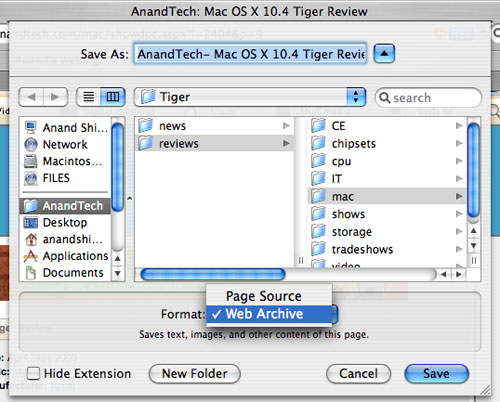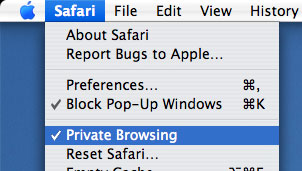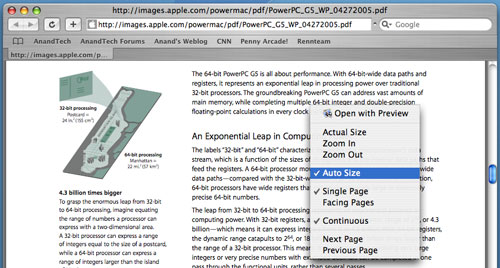Safari RSS (aka Safari 2)
In my first encounter with a Mac, I ragged on Safari for being a major disappointment under OS X; the browser looked great and was very user friendly, but it was sluggish and had a handful of annoying incompatibilities. With Tiger, Apple ships an updated version of Safari called Safari RSS.As its name implies, Safari RSS now allows you to read RSS feeds directly within the browser. Safari's integrated RSS reader is easy to read, well laid out, and works well within the Safari interface. I haven't really caught the RSS bug just yet, but Safari's implementation is quite nice. The only problem I have with it is that if a site offers more than one RSS feed, there's no way of accessing any but the first RSS feed listed in the site's code (Firefox will let you subscribe to any of multiple RSS feeds off of a single site without any problems).




Shortly before Tiger's official ship date, Apple released a brand new update of Safari for Panther users - Safari 1.3. Safari 1.3 (a part of OS X 10.3.9) offered some major improvements, mostly in the areas of performance and stability. The latest version of Safari finally solved the vast majority of my performance complaints about the browser, and as you would expect, Safari 1.3 under Panther performs quite similarly to Safari RSS under Tiger.
There are many cases now where Safari is actually faster than Firefox, but there are still some situations where Firefox is faster. What is most important is that Safari no longer feels like a slow browser, which greatly contributes to the subjective take on how fast modern day Macs happen to be - an area of weakness that can use any sort of improvement as is possible.
Safari's compatibility has come to bother me on a few occasions. Although, all of the sites that originally had Safari incompatibilities when I first started using the browser about a year ago have since been fixed. There still continue to be day-to-day incompatibilities with Safari; whenever I visit a website and things don't work exactly the way that I'd assume they would, I first have to open the page in Firefox to make sure it's not Safari causing the problems. This usually is a problem whenever I'm ordering something online or filling out any sort of form using Safari. If the submit button doesn't do anything or I get an error telling me that I didn't fill something out, yet I clearly did, then I know that I've been hit with another Safari incompatibility. For the most part, I'd say that Safari works fine on 100% of the sites that I read on a regular basis; however, it's the random sites or the times when I'm using sites that I rarely use that I sometimes encounter incompatibilities. They are annoying, but it's something that I've come to live with.
By far, the biggest problem with Safari that I've had is that the browser crashes, a lot, with certain web pages. Sometimes the crashing appears to be related to Flash; other times, it appears to be Javascript related and then there are other times when I can't even begin to pinpoint why it crashes. The problem seemed to have developed over time (possibly being made worse by subsequent OS X patches or just seeming that way by increased use of the browser), but it is definitely present on all systems. One thing that makes it difficult to diagnose is that I often have a large number of tabs open at once, and any one of those tabs could cause the instability. Needless to say, losing all open Safari tabs is a bit of a pain, and it's unfortunately something that hasn't been completely fixed in Safari RSS, but it does seem to have been somewhat addressed. I've only had a couple of crashes on the final version of Safari RSS and I've been using it a lot in preparation for this review.
I've mentioned in previous articles that I've always stuck with Safari because its look, feel and behavior matched what I'd expect from all other OS X applications. With Safari RSS, the decision to use Safari over something like Firefox or Camino (both of which I keep installed) is much less of a tradeoff. I only wish that Apple would add support for "find as you type" to Safari - it's the one feature that I truly do miss from Firefox.










55 Comments
View All Comments
aliasfox - Monday, May 2, 2005 - link
#31What you're forgetting is that in 1995-6, Apple wasn't losing money, it was hemorraging money. In 1995-96, Apple was irrelevant in regards to innovation of any sort. In 1995-96, Apple was selling PowerBooks with batteries (made by Sony, no less) that caught fire. When Jobs returned to Apple in '97, Apple's stock price hovered in the low teens.
It doesn't matter all that much that Apple's marketshare hasn't grown as fast as the rest of the market (and yes, it is growing- Apple recorded most Mac sales in one quarter last month), in absolute numbers, it's not shrinking. And Apple is making money, which is more than Gateway (who has a bigger marketshare than Apple) can say.
The goal of any company is to make money, regardless of size. In this respect, Jobs has succeeded. It doesn't matter if it was the Reality Distortion Field or if it was amazing marketing or if it was quality products that got Apple there.
downtowncb - Monday, May 2, 2005 - link
#43 "The bottom line is that [recoding Mac OS software for x86] will not be a big issue for the majority of developers, as you had originally argued."My original argument (#34) said nothing about Apple switching to x86; you must mean #39 by melgross.
I simply meant to state that Apple hardware and software work together to increase Apple's bottom line. Sorry if that was unclear.
msva124 - Monday, May 2, 2005 - link
>If you want an example of an obscure motherboard, I believe that the TMC Ti5tv qualifies but perhaps not.How does the TMC Ti5tv require Microsoft OS developers to deviate from programming for the x86 spec as usual? You stated before that programming around obscure hardware causes development problems and bugs, and gave motherboards as an example. I will not waste my time contacting Microsoft, since they know as well as I do that your argument is an unproven hypothesis. A hypothesis that is contradicted by the stability of x86 Linux, and unsupported by any sort of scientific evidence or systematic testing.
>Programs for x86 that use hand written assembly code or are othersiwe highly optimized would need to be redone. But whether this is "most" programs or not I don't know. Certainly not every single program, that is true.
I doubt that even 20% of mac software uses any assembly language whatsoever. Within that 20%, it is typically just one or two heavily optimized loops per program, which would take little time to recode for the x86 platform. The bottom line is that it will not be a big issue for the majority of developers, as you had originally argued. In fact, that argument is so preposterous that I can only assume that your initial post and all subsequent ones were flamebait. I will not respond to any more of your posts until you can convince me otherwise.
downtowncb - Monday, May 2, 2005 - link
msva124,If you want an example of an obscure motherboard, I believe that the TMC Ti5tv qualifies but perhaps not. If you need other examples of obscure hardware Windows supports, contact Microsoft.
Programs for x86 that use hand written assembly code or are othersiwe highly optimized would need to be redone. But whether this is "most" programs or not I don't know. Certainly not every single program, that is true.
If Apple isn't taking away from the Windows market, then which market is it taking away from? If we're talking percentages, something's got to give. Not that Microsoft's growth in terms of numbers of copies of OS sold won't outpace any such loss to Apple or whoever. I'm curious as to what you think.
Jbog - Monday, May 2, 2005 - link
#39 melgross, you say Apple directly competes with MS on the OS front. You also say Apple has always had different hardware. Sounds to me it's more like Apple trying to come up with more appealing OS in order to sell its platform. I mean, you can't just buy Tiger OS and replace Windows XP.If any strong argument can be made, it would be between Windows and Linux instead. One can migrate from Windows to Linux without having to buy a whole new set of hardware. You can even dual-boot Windows and Linux.
msva124 - Monday, May 2, 2005 - link
>If Apple were to change to an x86, then every program would have to be redone. That would be almost impossible for the many Mac developers out there .Most OS X programs are written in C or Objective-C, using the Carbon or Cocoa apis. Only those apis must be ported to the x86 platform, not every single program.
>Apple's increase in marketshare takes away from the Windows market itself
Right, except it doesn't.
melgross - Monday, May 2, 2005 - link
#32 Most of what you said is ridiculous.First of all, Apple's market share is growing. Of course other platforms sales aren't Apples sales. But most other sales aren't either Apple/Sun, etc.
This is mostly an Apple/Wintel market. Sun is only servers and Apple doesn't compete much in their space yet. Apple's server sales are increasing, but are only now ramping up. Except in the scientific Unix space, Apples server sales would be against Windows servers. They don't yet have the breath to compete in the higher areas yet.
Otherwise, it's Apple vs. MS.
Sure, other pc companies, or rather company (Dell) are growing, but that takes sales away from each other. Apple's increase in marketshare takes away from the Windows market itself. If Dell takes sale from Gateway, it's still a sale for MS. That's the point.
I suppose that Apple is taking away a few Linux sale as well, but it's almost all MS's.
All AMD did was to finally come out with better processors that they could actually make, rather than just announce, and then NOT make. While the 64 bit extensions was a little balsy, it's true, it didn't take away from their chips either. Even if it didn't go over, the chips would still have had the same characteristics as before. The extensions would not have been used, that's all.
Apple does directly compete with MS on the OS front. Apple has always had different hardware. When Apple went to the 68000 rather than the 8088 way back when, there were few arguments that the 68000 was not a better chip. Apple simply went on through from there.
If Apple were to change to an x86, then every program would have to be redone. That would be almost impossible for the many Mac developers out there . It's just like the Itanium. Little software development has been done for it. Why should Apple be caught in that trap?
michael2k - Monday, May 2, 2005 - link
If you want to call it "RDF", that is your choice.I'm using Microsoft's publically announced information to compare Longhorn to Tiger.
Nothing I've mentioned is 'rumored'. It's all been 'confirmed' by Microsoft.
WaltC - Monday, May 2, 2005 - link
#33 "Um, you do know from 1985 until 1996 Steve Jobs had no presence at Apple?"I believe I said the better part of the last decade to begin with, as I recall...;) Yes, I know that he was originally fired/pushed out by the Apple board around '85 and went on to NeXt--which failed, btw.
#33 "Release a simple, affordable, powerful, computer in 1984: Original Mac, which became a strong model of the computing industry for the next 21 years."
Oh yes--I suppose that's why the board fired him in '85...;)
33# "Release a powerful, modern, OS and computer in 1989: NeXTStep, which is now the foundation for Mac OS X and is now Tiger, and is AGAIN a strong model for the computer industry (Longhorn, Linux)"
Both NeXt and NeXTstep failed commercially as I recall. The "foundation" for OS X was kind of forced into play, you know...;) And, it was years late and initially very lacking in promised features (many of which it still lacks.)
#33 "Create the world's most popular mp3 player, the iPod, in 2001: It's a computer in every sense of the word, with a display, input, storage, and output functionality. It's 'revolutionary' status is because it was the first, smallest, fastest, highest capacity (all at once) device, though there were smaller, with smaller capacities, or larger, with larger capacities, and none with faster upload or UI in 2001."
Sorry, but the iPod is *not* a personal computer. But that's RDF thinking for you without a doubt...;)
#33" Again, as for why compare Longhorn to Tiger?
Because everything Longhorn WANTS to do, Tiger does.
Longhorn wants a DBFS, called WinFS, not due until next year. Tiger achieves 90% of that now, and by next year will be even better.
Longhorn wants better search, to be achieved with WinFS, not due until next year, when Tiger has Spotlight now.
Longhorn wants a 3d accelerated display layer, and is not due until next year. OS X has achieved that since 10.2 in 2002 (a small step with hardware accelerated compositing), now more fully implemented since 10.3 and 10.4 with 3d and 2d acceleration, and with even more to come by the time Tiger comes out.
Longhorn wants a 'modern' UI, which is not due until next year, where OS X has had it since 2001, with each year bringing out more usability and functionality to the UI (Dock, transparency, animation, Expose, Dashboard, etc).
Longhorn wants better security, again not due until next year, while OS X has it now, and since 2001
Longhorn wants a shell and CLI, again next year, while OS X has had it since 2001
You ask why we compare: I think it's stupid NOT to compare. Longhorn wants to be a 'next generation' OS, and it's prototype and model 'next generation' OS is available now, and has been for four years, in Mac OS X.
We're not the only ones comparing. As I said before, Allchin of Microsoft has made direct comparisons, to Microsoft's detriment."
Ah, yes, the RDF again...;) The truth of course is that *nobody knows* what Longhorn will be since Longhorn is a long way out. I see nothing wrong with a Tiger-x64 comparison because MS is *shipping* x64. Pretty simple, really.
superduperjacob - Sunday, May 1, 2005 - link
Anand - on page 7 you say:"To remove a widget, you have to still be in the add/remove widget mode and just click the x that appears next to all of the widgets."
If you hold down the option key in normal widget mode, the x appears and you can close the widget.